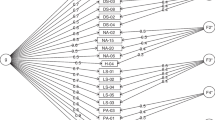Abstract
Purpose
The concept of maximising well-being, as opposed to merely treating mental disorder, is a powerful current theme in the area of mental health. Clearly this emphasises the need for appropriate valid and reliable measures of general well-being. This paper examines the appropriateness of a number of measures in this area and concludes that existing assessment tools fail to address the full range of aspects of personal well-being. This paper therefore presents the psychometric properties, validity and reliability of a new measure of well-being—the BBC Well-being Scale.
Methods
A total of 1,940 participants completed the new measure, the Goldberg scales of anxiety and depression, the ‘List of Threatening Experiences’ life events scale, a modified version of the Response Styles Questionnaire and a modified version of the Internal, Personal and Situational Attributions Questionnaire presented via the internet.
Results
Exploratory factor-analysis suggested a three-factor solution including themes of psychological well-being, physical health and well-being and relationships. The total 24-item scale had good internal consistency (α = .935) and correlated significantly with key demographic variables and measures of concurrent validity.
Conclusions
The new measure—the BBC Well-being Scale—is recommended for research and clinical purposes.

Similar content being viewed by others
References
Beddington, J., Cooper, C. L., Field, J., Goswami, U., Huppert, F. A., Jenkins, J., et al. (2008). The mental wealth of nations. Nature, 455(23), 1057–1060.
World Health Organisation. (1946). Constitution of the world health organisation. New York: World Health Organisation.
World Health Organisation. (2003). Investing in mental health. Geneva: World Health Organisation.
Department of Health. (2009). New horizons: Towards a shared vision for mental health. London: Department of Health.
Ryff, C. D., & Keyes, C. L. M. (1995). The structure of psychological well-being revisited. Journal of Personality and Social Psychology, 69(4), 719–727.
Kashdan, T. B. (2004). The assessment of subjective well-being (issues raised by the Oxford Happiness Questionnaire). Personality and Individual Differences, 36, 1225–1232.
Kahneman, D., & Krueger, A. B. (2006). Developments in the measurement of subjective well-being. Journal of Economic Perspectives, 20(1), 3–24.
Diener, E. (Ed.). (2009). Assessing well-being: Defining and measuring subjective well-being (Social indicators research series). New York: Springer.
WHOQOL Group. (1994). The development of the world health organization quality of life assessment instrument (the WHOQOL). In J. Orley & W. Kuyken (Eds.), Quality of life assessment: International perspectives (pp. 41–57). New York: Springer-Verlag.
WHOQOL Group. (1998). The world health organisation quality of life assessment (WHOQOL): Development and general psychometric properties. Social Scientific Medicine, 46(12), 1569–1585.
WHOQOL Group. (1998). Development of the world heatlh organisation WHOQOL-BREF quality of life assessment. Psychological Medicine, 28, 551–558.
The euroqol Group. (1990). Euroqol-a new facility for the measurement of health related quality of life. Health Policy, 16, 199–208.
Brooks, R. (1996). Euroqol: The current state of play. Health Policy, 37(1), 53–72.
Hu, Y., Stewart-Brown, S., Twigg, L., & Weich, S. (2007). Can the 12 item general health questionnaire be used to measure positive mental health? Psychological Medicine, 37(7), 1005–1013.
Diener, E., Emmons, R. A., Larson, R. J., & Griffin, S. (1985). The satisfaction with life scale. Journal of Personality Assessment, 49, 71–75.
Lyubomirsky, S., & Lepper, H. S. (1999). A measure of subjective happiness: Preliminary reliability and construct validation. Social Indicators Research, 46, 137–155.
Ryff, C. D. (1989). Happiness is everything, or is it? Explorations on the meaning of psychological well-being. Journal of Personality and Social Psychology, 57, 1069–1081.
Tennant, R., Hiller, L., Fishwick, R., Platt, S., Joseph, S., Weich, S., et al. (2007). The Warwick-Edinburgh mental well-being scale (WEMWBS): Development and UK validation. Health and Quality of Life Outcomes, 5, 63.
Huppert, F. A., Baylis, N., & Keverne, B. (2005). The science of well-being. Oxford: Oxford University Press.
Beck, A. T. (1967). Depression: Clinical, experimental, and theoretical aspects. New York: Harper & Row.
Goldberg, D., Bridges, K., Duncan-Jones, P., & Grayson, D. (1988). Detecting anxiety and depression in general medical settings. British Medical Journal, 8:297(6653), 897–899.
Brugha, T. S., & Cragg, D. (1990). The list of threatening experiences: The reliability and validity of a brief life events questionnaire. Acta Psychiatrica Scandinavica, 82, 77–81.
Nolen-Hoeksema, S., & Morrow, J. (1993). Effects of rumination and distraction on naturally occurring depressed mood. Cognition and Emotion, 7, 561–570.
Kinderman, P., & Bentall, R. P. (1996). A new measure of causal locus: The internal, personal and situational attributions questionnaire. Personality and Individual Differences, 20, 261–264.
Bentler, P. M. (1995). Comparative fit indices in structural models. Psychological Bulletin, 107, 238–246.
Bowerman, B. L., & O’Connell, R. T. (1990). Linear statistical models: An applied approach (2nd ed.). Belmont, CA: Duxbury.
Jöreskog, K. G., & Sörbom, D. (1993). New features in LISREL8. Chicago: Scientific Software.
Browne, M. W., & Cudeck, R. (1993). Alternative ways of assessing model fit. In K. A. Bollen & J. S. Long (Eds.), Testing structural equation models (pp. 136–162). Newbury Park, CA: Sage.
Hu, L. T., & Bentler, P. M. (1999). Cut-off criteria for fit indexes in covariance structure analysis: Conventional criteria versus new alternatives. Structural Equation Modeling: A Multidisciplinary Journal, 6, 1–55.
Kline, P. (1994). An easy guide to factor analysis. London: Routledge.
Field, A. (2005). Discovering statistics using SPSS. London: Sage.
Hu, L. T., & Bentler, P. M. (1995). Evaluating model fit. In R. H. Hoyle (Ed.), Structural equation modelling: Concepts, issues and applications (pp. 77–99). Thousand Oaks, CA: Sage.
Author information
Authors and Affiliations
Corresponding author
Rights and permissions
About this article
Cite this article
Kinderman, P., Schwannauer, M., Pontin, E. et al. The development and validation of a general measure of well-being: the BBC well-being scale. Qual Life Res 20, 1035–1042 (2011). https://doi.org/10.1007/s11136-010-9841-z
Accepted:
Published:
Issue Date:
DOI: https://doi.org/10.1007/s11136-010-9841-z



